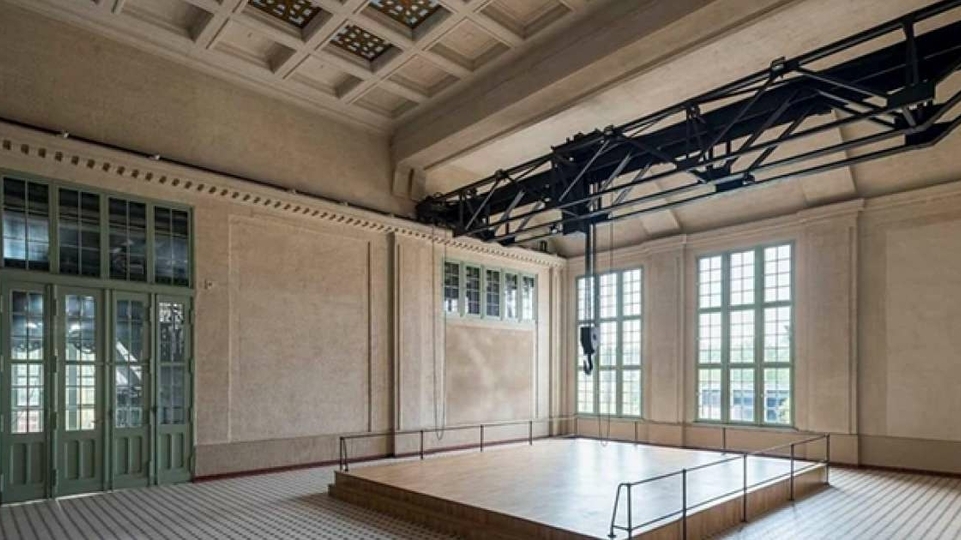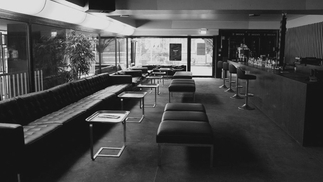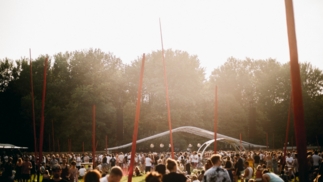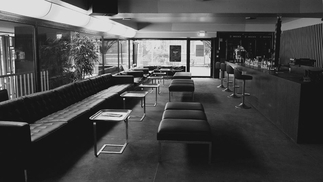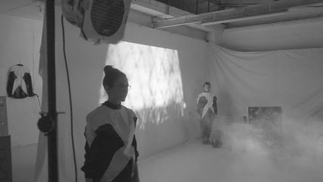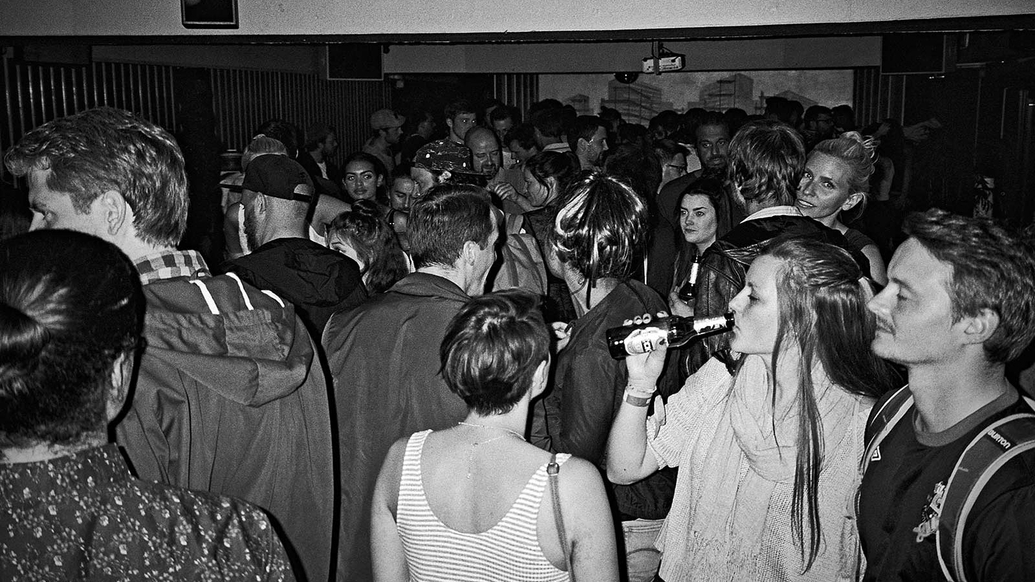
How the sound of Salon des Amateurs made it one of the world’s most influential clubs
Düsseldorf is a city steeped with a history of artists and clubs that have existed on the bleeding edge of alternative music – from Kraftwerk, Neu! and Liaisons Dangereuses to Cheesefactory and Rathinger Hof. Shuttering its doors last month, the city’s Salon des Amateurs has carved itself a intrinsic part of that story over the last 14 years. There, a group of uncompromising trailblazers established a sound that sought to challenge the paint-by-numbers approach which has consumed much of modern club culture. DJ Mag’s Rob McCallum sat down with Salon residents Lena Willikens and Vladimir Ivkovic at Amsterdam Dance Event to find out more...
It’s 3am in the morning at a packed out Salon des Amateurs, and Vladmir Ivkovic is playing b2b with Toulouse Low Trax. The Belgrade-born DJ has just dropped a section from Steve Reich’s defining generative composition ‘Music For 18 Musicians’ and, for a brief moment, the barman, dancing just to Ivkovic’s right wearing a T-shirt that reads “I hear voices and I don’t like what I hear” has been forced to stop serving drinks, as too many people are currently using his bar as a temporary dancefloor. As they duck to squeeze underneath the Salon’s low ceiling, the club’s usually booming soundsystem emanates the delicate track.
“If I was to introduce aliens to human intelligence, that is one of the records I would play them, as it is so beautiful and complex, and proof that we can do so much more with our brains than build Hiroshima and shit,” Ivkovic muses when he meets DJ Mag during this year’s Amsterdam Dance Event (ADE). “But to hear tracks like that, which were never made for clubs, and see people dancing on the bar, crying or taking their shirts off — those are beautiful moments.”
He’s flanked by Lena Willikens, the Düsseldorf club’s longest-running resident alongside Ivkovic and Toulouse Low Trax, at the Art Deco bar in Amsterdam’s Pension Homeland hotel, a haven converted from a former Royal Dutch Navy officers’ quarters just out of the city on its eastern docklands. Through its history, Salon, which was forced to shutter its doors for an undisclosed period in November, has nurtured a sound that’s permeated nightlife on a much wider scale than its own dancefloor, much like iconic clubs including CBGB’s in New York and Hamburg’s Front, which was recently honoured by Running Back with a retrospective compilation.
U N O R T H O D O X
Salon’s music, bearing an unconventional aesthetic that refuses to be genre cast, rides an underexplored line between the dancefloor and the avant-garde. Its sound is typified by a sometimes brooding, often urgent but always arresting approach to weaving music together that can incorporate anything from cosmic synth to psychedelia, new wave, no wave, minimal wave, post-punk, hammering techno, minimalism, Krautrock and anything else from its residents’ cavernous and wide-reaching record collections. More about an attitude than a specific genre, the sound of Salon is enveloped in an approach to playing music — an idiosyncratic way of DJing that incorporates left-of-centre electronic, and often not electronic music from the past 40 years. It’s a form of dance music that isn’t what most people think of as being clubcompatible at all.
“Theoretically you can dance to anything,” Ivkovic explains as he sips his beer. “We were never a group of people who were house or techno residents. We were never interested in that purpose for music. I’ve experienced people dancing and crying to music like [Furniture’s ‘Why Are We In Love’] rather than listen to generic house and techno. That’s such a precious, wonderful thing. I was also never a person who had to go out for the sake of it. I don’t need to if it isn’t interesting for me. I want to be confronted with something that I don’t know, as that triggers something, and at Salon it was always challenging. But what was there first: the attitude or the name? I really don’t know. I guess the name somehow shaped the attitude but, simply, for me it’s always been a safe space to do things I was interested in.
“And that gives you a lot of freedom, as you get the chance to play records you’ve never been able to play before,” Willikens interjects. “It also means you are not afraid of failure. And failure can lead to something so beautiful. But nothing ever felt like a risk at Salon. It was always totally natural.”
Both artists are now heavily touring DJs in their own right, with busy schedules throughout the year, while Toulouse Low Trax (real name Detlef Weinrich) is a prolific producer who’s released on labels including Antinote and Themes For Great Cities. Willikens first started working on the door at Salon in 2006, before going on to work at the bar and play records — regularly at the same time — and curated the music programme on Fridays up until last year. This year, she’s seen her ‘Selectors 005’ compilation land via Dekmantel, as well as co-write the score for audio-visual drama Phantom Kino Ballett. Outside of the Salon, Ivkovic runs Offen Music, as well as, perhaps surprisingly to some, being label manager for Loco Dice’s Desolat imprint. The pair explain that a number of factors nurtured the sound of Salon, but one of the biggest was the fact that the space, which is in the building of contemporary art gallery Kunsthalle Düsseldorf and started life as its café, was never initially intended to be a club.
“It was just a place where we all came together and listened to music,” Willikens says. “Nobody knew exactly what it was. There is still no defined dancefloor, or peak time. It never really existed. There was no label, no stamp for it or blueprint for how to do things. For some people it was a café, for others it was a bar where people would gather and talk about weird stuff. It was not our decision of, ‘Let’s open a club’. It was the people that came that were responsible for that.” “Then Salon simply developed a life of its own,” Ivkovic interjects. “There was no-one to tell you what was right and wrong, or that you had to do things in a certain way.”

“Everything became so clean and predictable in nightlife, and how to compose a club-night. It’s like painting by numbers. You can see it’s going to be a duck at the end when you connect dots one to 24, but people still do this”
This openness to experimentation that the venue allowed gave the core residents at Salon the chance to develop their own way of presenting a vast array of music in an entirely cohesive manner. “I don’t think we invented anything,” Willikens says. “If you listen to [Daniele] Baldelli mixes from the early ’80s, it’s already there, but what we did have is the perfect place for shaping our own language. We had a safe place to really shape a way of expressing ourselves.” “There were times at Salon that we made it quite difficult for ourselves, but never for the wrong reason,” Ivkovic continues. “It wasn’t on purpose, it was just the music we enjoyed playing and wanted to hear loud,” Willikens says. “I don’t want to piss people off,” Ivkovic agrees. “That’s not why I’m on this planet. But I would probably rather commit suicide than pretend beat-matching generic house records for seven hours. It’s insane. I’d stay at home and read a book or meet people some other way. I could not do it. I love and own proper house and techno records, but I’d be bored, stuck in this funny rat race that I refuse to participate in. It’s against everything that I think about life. I’d go and work for a bank and earn serious money, as it would be the same mental level.”
O P E N I N V I T A T I O N
Sat on the water in the city’s eastern docklands, Homeland Pension’s brutalist concrete architecture feels fitting to the esoteric music we are discussing. But the pair say that the sound of Salon is widely misunderstood. “A lot of people say it’s about being slow, and that we pitch everything down and play things at the wrong speed,” Willikens says. “This is something I really have to say, ‘No, no, no! Stop, stop, stop!’ As it isn’t necessarily slow, or dark.” They explain how the sound of Salon can just as easily be Autechre’s stunning remix of D-Breeze’s ‘Crazy For Love’ as it can Cristian Vogel’s brutal 1994 techno cut ‘Way Of The Wyrd’. “None of the people that think Salon is just grumpy people playing slow music would dare touch that, as it’s too intense for their idea of techno,” Ivkovic says. “It isn’t all about slow bpms, we also play plenty of records pressed at 33rpm on 45.”
Earlier in the afternoon, before Willikens and Ivkovic meet DJ Mag, they sit on an ADE workshop titled The Record Bag Of. There they explain that they see DJing more as a form of self-expression than solely as a vessel for entertainment, and express, through Salon — a back-to-basics venue with not much more than its soundsystem and a bar in an intimate space with a low ceiling to hold in the atmosphere — their desire to break the mould of modern-day club culture. “Everything became so clean and predictable in nightlife, and how to compose a club-night,” Ivkovic says. “It’s like painting by numbers. You can see that it’s going to be a duck at the end when you connect dots one to 24, but people still do this. Music is never interesting when its only intention is entertainment. Why would I make someone, who in most cases is working for a system that is hostile to my friends and family, forget his sorrows so he can go back fresh to work on Monday morning and do things that I do not necessarily like? That would also be so cheap and manipulative, and not honest. We’d be feeding the monster that I don’t want to feed.
“At Salon, you don’t have epic breaks, strobelights or any external sensations that will put you in a certain frame where you’re easy to manipulate,” he continues. “That was never our intention. What we gave was an open invitation to spend the night with us. If you stay, you’re most welcome and if you go, you’re also welcome to do so, there’s probably somewhere just around the corner for you. But if you do stay, maybe something special will happen.” “People did complain that we are too depressing,” Willikens says. “They were drinking their cocktail and expecting something different, so we suggested they should go somewhere else. I do prefer it when someone really hates it, or really loves it though, as you’ve left a genuine impression.” Willikens says this approach allows them to break out of the confines of what is considered ‘club music’. “It’s like when I see a painting where the artist is struggling, but you can feel that they’ve searched for something and have really experimented,” she adds. “That’s much more interesting than looking at a high renaissance [piece], when they knew the exact essence. You have the recipe of how to paint the perfect picture. Nowadays, you have the exact recipe of how to compose a club hit. It’s so easy.”
P A R T O F D Ü S S E L D O R F
The venue’s name is a play on Société Des Artistes Français, an association of French painters and sculptors established in 1881 that holds an annual exhibition called the “Salon des artistes Français”. And they say the amateur part of the name is something they always wanted to maintain in their ethos. “What was fantastic about Salon was that you never had people who had ‘jobs’ there,” Ivkovic says, noting that the whole team at the venue became more like a family.
“Because Salon had the bar, and then an extension to the bar was the turntables,” Willikens cuts in. “It always really felt like we all threw the party together.” They also say the crowd had a huge impact on allowing them to take the sound of Salon in more challenging directions. With Düsseldorf home to the Kunstakadamie, one of Europe’s leading art colleges, the dancefloor was usually made up of a large proportion of art students. “By nature, because of that, you have people who are ready to hear a little more, or willing to be triggered by something else,” Ivkovic says. “The art academy has shaped the entire musical history of Düsseldorf, from the ’60s,” Willikens agrees.

“That’s what I hope is the legacy of Salon: to see this curiosity happening everywhere”
A city with a past of producing artists and spaces that exist on the bleeding edge of alternative music, from Kraftwerk, Neu!, DAF and Liaisons Dangereuses to seminal venues including Cheesefactory and Ratinger Hof, Salon des Amateurs has carved itself a vital part of that story over the last 14 years. Its sound has also served to inspire a new generation. Before the club closed its doors for an “undisclosed period” for reparations to its building at the beginning of November, the likes of Lucas Croone, Jan Schulte — under his Wolf Müller/Bufiman guises — and Phillip Jondo all played the weekend-long closing party — musicians that grew up at Salon before becoming successful artists in their own right. The club has also closed at a time that larger dancefloors are becoming much more open to experimentation, with global sounds and nonlinear electronic music permeating Europe’s clubs and festivals.
“It was a fortunate constellation at a certain point in time,” Willikens says of the legacy of Salon. “A lot of people got bored of functional DJs, and they stumbled across this weird, in their eyes at least, thing happening, and became curious. What would make me happy is if we managed to encourage young people to open up and young DJs to do their own thing and play music which is seen as risky to some.” “That’s what I hope is the legacy of Salon: to see this curiosity happening everywhere,” Ivkovic adds. “It is the responsibility of all of us to keep these places alive, because nobody else is going to do it for us. We get lots of people asking us to do Salon des Amateurs nights at their club. But it is your own responsibility to create an environment where you can have your own Salon. There are plenty of people in different cities who never get the chance, so give them the freedom to express themselves — then you will have your own Salon, whatever it looks like, and you won’t have to invite us.
“Whatever happens though, Salon is part of the history of Düsseldorf now,” he says. “It has equal importance as Rathinger Hof, as Kraftwerk, back when it was punk or kraut. I can sign that with my own blood.”
